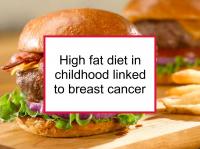Dietary and lifestyle factors influence breast cancer risk at each stage of life. This gives us an opportunity to reduce the risk of our daughters. Breast tissue is particularly vulnerable to carcinogens during the prepubertal period since it represents the onset of a time of rapid proliferation and differentiation of breast cells.
Based on available studies, it make sense to use oils rich in omega-3 fatty acids or olive oil rather than butter, lard or oils with high omega-6 fatty acid content. This means emphasizing olive oil and walnut oil in preparing meals for children instead of high omega-6 oils such as corn oil, sunflower oil and soybean oil. It also makes sense to introduce fatty fish into the diets of children.
Now a new study has reported that a diet high in animal fat during the prepubertal period accelerates mammary tumor development in a mouse model of breast cancer and that the tumors have characteristics similar to triple negative (ER-/PR-/HER2-) disease.
Furthermore, switching to a low-fat diet during adulthood does not reverse the tumor promotion caused by the high fat diet in the peripubertal period.
Milk is the exception
Although we recommend against milk consumption during adulthood because it may promote breast cancer, milk appears to be somewhat protective against breast cancer when consumed in infancy and childhood. A partial explanation may be the fact that milk is a very good source of calcium and vitamin D, both of which are known to protect against breast cancer. Exposure to estrogen (also found in milk) during childhood also appears to be protective against subsequent breast cancer, although the mechanism of action is not understood. Milk consumption is also associated with higher bone mineral density and other measures of bone health, which are crucial in children. A milk-free diet would have to be carefully designed to include the nutrients that milk supplies in the typical U.S. diet.
The point in time during which milk becomes a breast cancer risk factor in U.S. girls appears to be late adolescence. We would recommend organic milk (from grass-fed cows, if possible), but not raw milk for children. Non-organic milk contains additional recombinant bovine growth hormone, zeranol and other potentially harmful additives administered to cows and sheep. Raw milk could be a source of bovine leukemia virus (BLV), which has been reported to be associated with increased breast cancer risk.
Latest research finds high animal fat diet accelerates tumorigenesis
The study referenced at the beginning of this news story was designed to investigate the influence of a high animal fat diet during the peripubertal period on mammary tumor development in an animal model of breast cancer. To conduct the study, the authors used obesity-resistant BALB/c mice. The authors previously demonstrated that exposure to a high saturated animal fat diet from peripuberty through adulthood promoted mammary tumor development in this type of mouse.
In the present study, groups of mice were fed either a low-fat diet or high fat diet and were subjected to a carcinogen which reliably induces mammary tumors. At nine weeks of age, half the mice on the low-fat diet were switched to the high fat diet (LFD-HFD diet group). In addition, half the mice on the high fat diet were switched to the low-fat diet (HFD-LFD group). The authors assessed tumor gene expression in association with diet and tumor latency (time to tumor appearance).
The peripubertal high fat diet reduced time to tumor development and was associated with tumor characteristics similar to those in mice fed a continuous high fat diet. Remarkably, fast-developing tumors in both groups shared features of gene expression and were more likely to have adenosquamous histology (i.e., containing both squamous and gland-like cells, and having basal-like breast cancer features). Both the HFD-LFD and continuous high fat diet tumors showed similar gene expression features and shortened time to tumor development. Importantly, the switch in adulthood from the high fat diet to the low-fat diet did not reverse the tumor promotion caused by the high fat diet in the peripubertal period. Heightened tumor promotion was associated with increased proliferation, hyperplasia, and number of macrophages in the mammary glands even before obvious tumor development. The authors conclude that in obesity-resistant mice, a peripubertal high animal fat diet is sufficient to irreversibly promote carcinogen-induced tumor development. Notably, tumors with short development times occurring after peripubertal high fat diet had characteristics similar to human basal-like breast cancers (including triple negative breast cancers) that tend to develop in younger women.
Please see our articles on beef and diet during childhood and puberty for more information.
